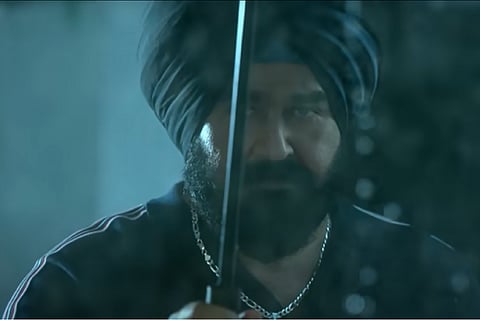

Warning: This review has major spoilers and discusses the ending of the movie. Do not read further if you don't like spoilers.
Monster, Mohanlal’s new film written by Udaykrishna and directed by Vysakh, comes with many problems. Four days before the film released, there were reports of a ban in Gulf countries because it has LGBTQIA+ content. The filmmakers had however not given an official statement confirming or denying it. Perhaps it is because the LGBTQIA+ content comes out only towards the end of the film, forming its climax and the answer to the crime the film has been trying to solve. Even if you brush aside the poor scripting and filmmaking and annoying characterisations until then, you have to call out the brash, problematic and completely senseless portrayal of a lesbian couple, played by Honey Rose and Lakshmi Manchu.
Mohanlal is introduced as Lucky Singh, an important client of the taxi service that Bhamini (Honey Rose) works for as a driver. The long sequences of the taxi ride, meant for mass appeal and comedy, appear more like a punishment, a sentence given to those who chose to watch the movie early in the morning. To give the Punjabi air, the beats of Bhangra are in the background every time Mohanlal delivers a ‘punchline’ – which mostly circle around how pretty Bhamini is, or Lucky Singh’s bachelorhood. To add to it, Lucky has to make cracks about the woman driver not knowing a thing about a puncture fix.
'Subtle' messages like these pour out from scene 1. Bhamini is cooking breakfast for the family and her husband Chandran (played by Sudev Nair) laments that she has to do all this work and she promptly says, “That’s ok, it is for my family right?” To every woman and particularly every feminist hearing this, the film seems to say, "Don’t make a big deal out of cooking." Both Sudev and Mohanlal’s characters are shown as men who cook, with Lucky Singh pointedly adding, “of course men should know how to cook.”
In the midst of it all is also a child called Kunjatta, looking very much like Baby Shalini of the 1980s — Jess Sweejan playing the kid of the couple Bhamini and Chandran. She does a good job, dancing to a totally unnecessary song Lucky begins singing in their apartment, after barging into the house. Perhaps the only likeable character in the whole script. Though it is not clear what the purpose of Kunjatta is, except by way of allowing the entry of Durga (Lakshmi Manchu) as her ayah.
Watch: Trailer of the film
After giving the fans all the mass scenes and comedy, Lucky begins to show a different side of his, pulling out a gun, acting mysterious, throwing Bhamini into a crime she had no part in. The big suspense behind Bhamini’s so-far nice and loving character only comes out in the climax, in a big haunted-looking house that Mohanlal enters alone, unarmed. By then Lucky has changed costumes and is in the robes of an investigating officer — his turban's gone, but the beard stays. That’s when you are given the back story of Bhamini and Durga, who both remove their disguises and put angry expressions on their faces.
They tell their story of humiliation from many years ago — drawing from the real life wedding of a lesbian couple, legally recognised by a Haryana court in 2011. Durga – also known as Catherine – says how, after the wedding, the two women were attacked in their house, dragged out, beaten up and humiliated. And how the law that should have protected them did nothing. You cannot, for a minute, appreciate the momentary honesty the script allows, because by then the couple reveal that they turn to crime as a way of making money to go somewhere outside the country so they could live together peacefully.
The crime they choose is murder, Bhamini pretending to fall in love with a man, marrying him, making him take an insurance of a large amount in her name and then killing him so the money comes to her. Right, after going through some really horrible humiliation, the first thing they choose to do is turn to crime. A terrible portrayal by a film that claims to be progressive, as if LGBTQIA+ communities in the country aren't demonised enough already. As if LGBTQIA+ people need more stereotypes than those already imposed on them. Please, you’d want to tell the makers, if this is how you make progressive content, stop.
Disclaimer: This review was not paid for or commissioned by anyone associated with the series/film. TNM Editorial is independent of any business relationship the organisation may have with producers or any other members of its cast or crew.